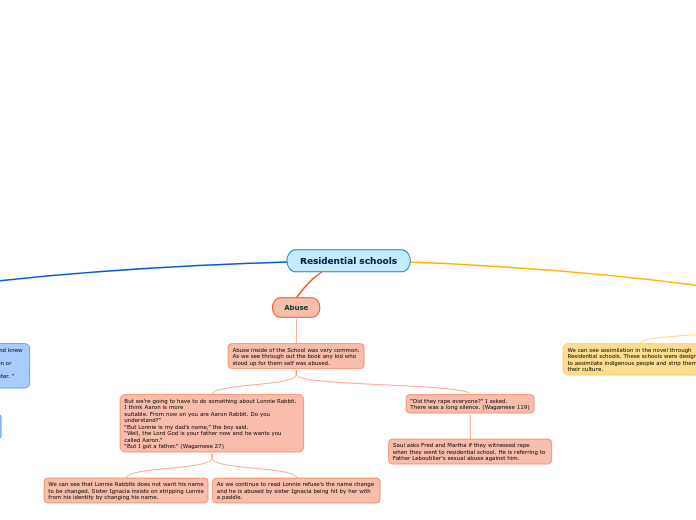Residential schools
Racism
In the novel Indian horse Racism Plays a huge
in Residential schools as indigenous people
were looked as inferior
"Most of them had been pulled from the deep North and knew only Ojibway.
Speaking a word in that language could get you beaten or banished to the box in the
basement the older ones had come to call the Iron Sister. "
(Wagamese 28)
Here we can see that the racism is so bad
that if a word of Ojibway is spoken than
punishment's like abuse were to be used.
Abuse
Abuse inside of the School was very common.
As we see through out the book any kid who
stood up for them self was abused.
But we’re going to have to do something about Lonnie Rabbit. I think Aaron is more
suitable. From now on you are Aaron Rabbit. Do you understand?”
“But Lonnie is my dad’s name,” the boy said.
“Well, the Lord God is your father now and he wants you called Aaron.”
“But I got a father.” (Wagamese 27)
We can see that Lonnie Rabbits does not want his name
to be changed. Sister Ignacia insists on stripping Lonnie
from his identity by changing his name.
As we continue to read Lonnie refuse's the name change
and he is abused by sister Ignacia being hit by her with
a paddle.
“Did they rape everyone?” I asked.
There was a long silence. (Wagamese 119)
Saul asks Fred and Martha if they witnessed rape
when they went to residential school. He is referring to
Father Leboutilier's sexual abuse against him.
Assimilation
We can see assimilation in the novel through
Residential schools. These schools were designed
to assimilate indigenous people and strip them from
their culture.
. “At St. Jerome’s we work to remove the
Indian from our children so that the blessings of the Lord may be evidenced upon them.” ( Wagamse 28)
In this quote we understand that father Quinarily means
that St. Jerome's Residential school is structured
to remove the Indian culture from the children's.
This is a prime example of Residential schools
purpose as one of the leaders of the school itself
explains that they are their to "Remove the Indian"
( Wagamse 28)
